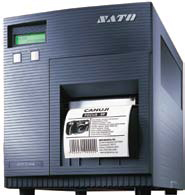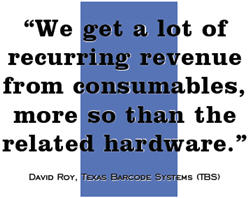Don't Pass Up Additional Printer Business
By Brian Albright, Business Solutions magazine
Hands-on service and training helped this Texas VAR gain lucrative new service and consumables sales.
Successfully selling commodity items like bar code printers requires more than just pushing boxes. Servicing, supporting, and supplying consumables can generate substantial recurring revenue for resellers and integrators. That’s true even if the VAR wasn’t involved in the original hardware sale.
 Consider Texas Barcode Systems (TBS), a Plano, TX-based reseller that won ongoing business with a large beverage manufacturer because the company was able to provide the training and service the client needed after the company that supplied the original hardware failed to do so. Now, TBS is moving large volumes of consumables for the client and has gained additional maintenance and hardware business.
Consider Texas Barcode Systems (TBS), a Plano, TX-based reseller that won ongoing business with a large beverage manufacturer because the company was able to provide the training and service the client needed after the company that supplied the original hardware failed to do so. Now, TBS is moving large volumes of consumables for the client and has gained additional maintenance and hardware business.
The client uses 10 SATO CL408e thermal transfer bar code printers to generate labels for shipping, receiving, and inventory purposes. The company labels both raw materials and finished goods on shrink-wrapped pallets using 4” x 6” thermal transfer paper labels that are scratch- and smear-resistant.
According to David Roy, executive vice president and cofounder of TBS, the client had previously purchased data collection terminals from his company, but the printer fleet came from another reseller. Unfortunately, that vendor failed to train the client on how to service and maintain the printers.
When a printer required repairs, the client actually had to ship the unit out of state to a separate facility. Sometimes these repairs weren’t completed, and the printers were returned still nonfunctional. With limited printing functionality, shipping and receiving operations ground to a halt.
“The printers weren’t being maintained, which was causing poor print quality. The text and bar codes were unreadable,” Roy said. “The users had never been trained properly on daily maintenance, cleaning print heads, cleaning the rollers, and the proper way to load media or adjust media.”
Hands-On User Training
About a year ago, a manager at the company called Roy and asked if he could come to the plant and look at the printers in person. “They were really in a critical position, and he asked if I could come down that same day,” Roy says. “I was able to adjust two of the printers within an hour of getting there, and within a few days we had all of them up and running once we got the parts we needed.”
Roy and his team brought the printers back into specification and also provided operator training on daily maintenance. “They had not had any hands-on training, and they were extremely happy that a new vendor would come on-site and provide that service at no extra charge,” Roy says.
That training proved critical. The existing printers were plagued with everything from burned-out printheads to rubber rollers that had been gouged with knives or screwdrivers in an effort to remove jammed labels. Had the employees been properly trained, most of those issues could have been avoided, saving the client costly downtime.
“We go in there and work with the operators until they feel comfortable, no matter how long it takes,” Roy says. “If they are uncomfortable with any of the procedures, we make sure they get comfortable. Otherwise, they wind up damaging those parts of the printer.”
 Since that initial visit, Roy has handled all of the client’s maintenance and repair needs, as well as providing ribbons and hand-delivering 80,000 labels per month. TBS also has the data collection terminal business at that facility, including extended-range scanners and forklift-mounted data collection terminals from Motorola, along with mounting brackets and forklift take-up reels for the scanners. On the print side, the company will soon be replacing a number of the SATO printers with newer models. In addition, the client has recommended Texas Barcode to other divisions of the company (including its dairy facility, which supplies grocery stores nationwide), generating even more business.
Since that initial visit, Roy has handled all of the client’s maintenance and repair needs, as well as providing ribbons and hand-delivering 80,000 labels per month. TBS also has the data collection terminal business at that facility, including extended-range scanners and forklift-mounted data collection terminals from Motorola, along with mounting brackets and forklift take-up reels for the scanners. On the print side, the company will soon be replacing a number of the SATO printers with newer models. In addition, the client has recommended Texas Barcode to other divisions of the company (including its dairy facility, which supplies grocery stores nationwide), generating even more business.
For the client, working with Texas Barcode has eliminated printer-related downtime. Before, when the printers failed, employees had to hand-write shipment information and then rekey it into the company’s systems. That bogged down shipping and receiving operations and eroded productivity. “The customer is realizing much improved quality and performance out of their system, as well as less stress and frustration,” Roy says. “They know we’re just a phone call away, and we can be on-site that day if they have a problem.”
For TBS, the relationship has resulted not just in new hardware sales, but also lucrative ongoing monthly revenue from the high volume of labels. “There’s no exclusive agreement,” Roy says. “They buy from me because of the service I provide. I hand-deliver those labels every month, and every time I’m there I talk to the operators to make sure they are still feeling comfortable with the equipment. I make sure the printheads are clean and take time to work with any new employees who are operating the printers.”
Because the printers can remain in service for years, Roy says that labels and ribbons are an important part of his business. “We get a lot of recurring revenue from consumables, more so than the related hardware,” Roy says. “It truly is like the razor and razor blade model. Once you give the customer a good quality razor, you can just refill the razor blades as often as needed. The SATO printers are rugged, hearty printers, and if you give them just a little TLC, they’ll run a long time.”
For this client in particular, paying attention to the details — user training, maintenance, and recognizing all of the company’s labeling needs — continues to pay dividends for TBS. There is nothing more frustrating than someone having to deal with a printer that doesn’t work. They want to print the label, scan, and go,” Roy says. “This isn’t rocket science. It’s just customer service.”
